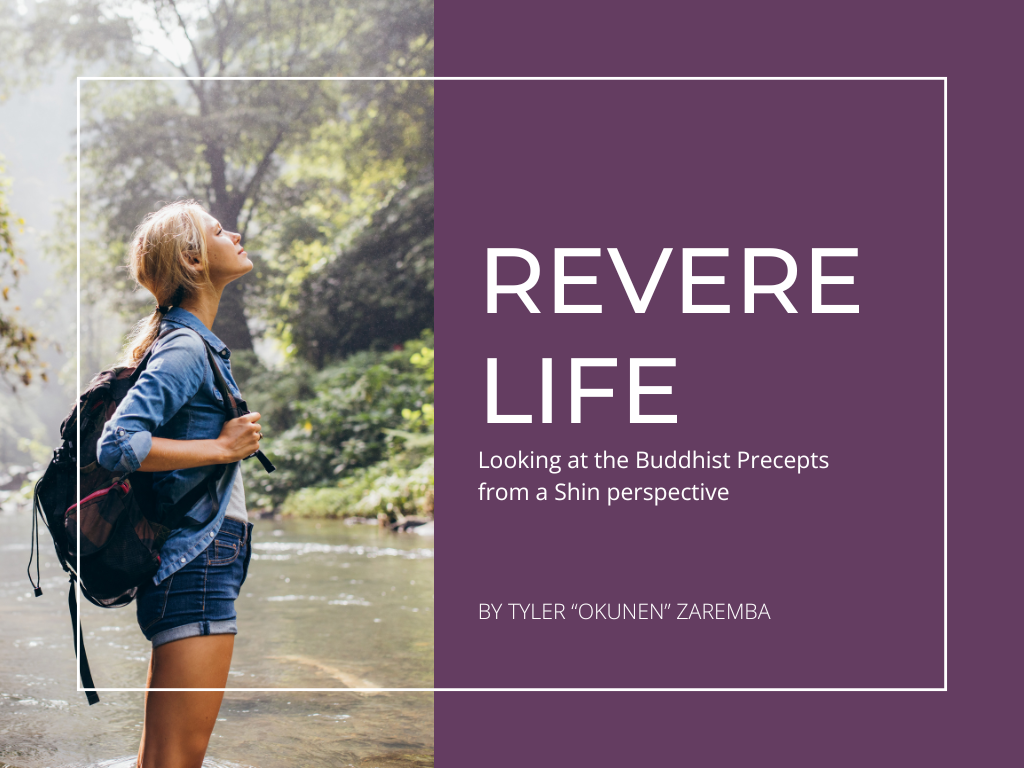TODAY’S POST IS FROM A GUEST BLOGGER, TYLER “OKUNEN” ZAREMBA. MR. ZAREMBA IS A BCA MEMBER AS WELL AS A VIRTUAL MEMBER OF EKOJI. IN ADDITION TO HIS INVOLVEMENT IN THE SHIN BUDDHIST COMMUNITY, HE IS ALSO A MEMBER OF EVERYDAY BUDDHIST. WE ARE SO HAPPY TO FEATURE THIS BLOG POST ON THE HISTORICAL ROOTS OF NON-DUALISM IN SHIN BUDDHISM.
Precept Work for Shin Buddhists (Part 1)
BY TYLER “OKUNEN” ZAREMBA
While the five Buddhist lay precepts are not a primary focus in Shin Buddhism, they can still enhance a practitioner’s life. Many Shin Buddhists find meditation beneficial, even if it isn’t a central practice. Practicing the precepts, however small, can be especially valuable in the Age of Dharma Decline. Despite being embraced by Amida Buddha’s compassion, we should strive not to violate the precepts intentionally. As Shinran Shonin wisely noted in the Tannisho, having an antidote doesn’t justify consuming poison.
Engaging with the precepts has been personally beneficial to me, and it’s an ongoing journey that lasts a lifetime. My former Soto Zen teacher often said, “You are perfect as you are, but you could still make some progress.” This statement beautifully encapsulates how the precepts can coexist with the universal acceptance found in Jodo Shinshu.
The five precepts are traditionally framed negatively, focusing on what to refrain from doing. However, the late Thich Nhat Hanh reimagined them in a more positive light, encouraging compassionate actions rather than merely avoiding certain behaviors. Traditionally, the five precepts are:
- Refrain from killing
- Refrain from stealing
- Refrain from sexual misconduct
- Refrain from lying
- Refrain from intoxicants
Thich Nhat Hanh rephrases them as follows:
- Revering Life
- True Happiness
- True Love
- Loving Speech and Deep Listening
- Mindful Consumption
Let’s explore how we can incorporate these five precepts into our daily lives, beginning with the first.
Revere Life – Refrain from Killing
To live is to inevitably cause harm to other living beings, whether directly or indirectly. This is an unavoidable truth of existence. However, this reality does not mean we should passively accept it. Instead, the first precept in Buddhism encourages us to cultivate a deeper reverence for life.
We instinctively draw a line somewhere when it comes to causing harm, but the first precept guides us to continually push that line further, striving to reduce the harm we cause. This isn’t about achieving perfection, but rather about making conscious and compassionate choices that reflect a growing respect for the interconnectedness of all life.
Possible Actions:
- More Plant-Based Meals: Even small reductions in the consumption of animals can significantly lessen the impact on animal life. Consider incorporating more plant-based meals into your diet.
- Humanitarian Efforts: Support human life by volunteering at homeless shelters, participating in food drives, or donating to charities that help those in need. Your actions can make a significant difference in the lives of struggling people.
- Mindful Eating: Practice gratitude and mindfulness when eating, acknowledging the human and animal lives affected to bring food to your table.
- Gentle Living: Be aware of the living beings around you. When possible, choose non-lethal methods for managing pests.
- Compassionate Journaling: Embrace the practice of revering life by journaling daily about what you are grateful for and noting actions where you can improve in revering life.
Takeaway:
Revering life requires mindfulness of our actions and their impact on all living beings.
The next article in this series will delve into the next two precepts: Refrain from Stealing (True Happiness) and Refrain from Sexual Misconduct (True Love). Stay tuned!



Add Your Comment